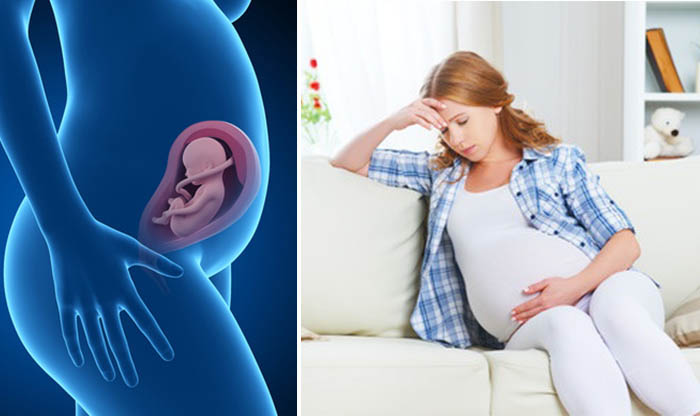Getting pregnant is a blessing and a fabulous gift, but unfortunately, not all pregnancies are the happy time.
The high-risk pregnancy is one of them and it comes with a long list of complications, which can put both a mother and a fetus at risk.
The high-risk pregnancy requires a lot of regular check-ups, more ultrasounds, and even hourly or daily monitoring, when a mother-to-be reaches the third trimester.
Join Agogo Newsletter
And get Updates for Better Health.
There are certain factors and that situations can contribute to a high-risk pregnancy. Whether you’re a mom-to-be or you’re thinking about the baby, be aware of the causes and prevention of the high-risk pregnancy.
What are the high-risk pregnancy conditions?
There are four main types of the high-risk pregnancies, such as placenta previa, gestational diabetes, preeclampsia, and preterm labor.
Placenta previa is a rare condition that affects one percent of pregnant women, but still possesses a serious risk for a mom and a baby alike.
It’s particularly dangerous during a labor when the uterus expands and the cervix dilates, a part of the placenta tears and bleeds, causing the mom-to-be to hemorrhage.
Women over 40s, who had abortions or C–sections, or carrying multiple fetuses are at risk of placent previa. Bleeding during the second or/and third trimester is the major symptom of this condition.
Gestational diabetes affects 4 percent of pregnancies and puts the fetus at risk. Pregnant women with the high blood sugar levels are more likely to develop gestational diabetes. The symptoms are blurred vision, increased urination, and constant thirst.
Preeclampsia affects more than 8 percent of pregnancies and is characterized by high blood pressure and the large amount of protein in the urine that prevents the growth of the blood vessels in the placenta.
Preeclampsia causes impaired liver and kidney function as well as blood clotting. Pregnant women carrying twins or having a family member who has had preeclampsia, and women over 40 are at risk.
Preterm labor is caused by certain vaginal infections and an abnormality of the cervix. Pregnant women with a history of premature labor or who carry more than one fetus are at risk. Preterm labor tends to occur before the 37th week. The statistics show that over 10 percent of newborns are premature.
What are the major causes of a high-risk pregnancy?
Pregnant women who had some issues in the previous pregnancies, teens, and women over 35 are often diagnosed with the high-risk pregnancy. However, there are a lot more factors that can contribute to a complicated pregnancy. If your pregnancy is unplanned, it’s harder to reduce your risk. But if you’re planning to conceive, it’s vital to see your doctor and find out whether you have any chronic conditions.
Here are health conditions that look out for because they can increase your risk of a complicated pregnancy:
- Type 1 or type 2 diabetes. When you suffer from diabetes and isn’t managed properly, you might have a higher risk of the pregnancy complications, such as high blood pressure, birth defects, macrosomia (having a very big baby), and having a premature labor. Your newborn may have jaundice, problems with breathing, or low glucose levels.
- Thyroid diseases. Both hyperthyroidism (an overactive thyroid) and hypothyroidism (an underactive thyroid) during pregnancy can lead to a number of serious issues for you and your fetus. When left uncontrolled, a thyroid disease can increase the risk of preeclampsia, miscarriage, having your baby early, and low birth weight.
- Putting on some pounds during pregnancy is a natural process. However, if you have a body mass index (BMI) of more than 30 before you conceived, you have a bigger risk of high blood pressure, type 2 diabetes, and gestational diabetes during your pregnancy. Moreover, you’re more likely to have a cesarean delivery or need your labor induced.
- Maternal age. Even though a woman can become a mom at any age, those who are older than 35 might have a high-risk pregnancy. Being a young mom (in your teens) increases the likelihood of some serious health problems and complications.
- Autoimmune diseases like lupus put you at risk of having a small baby, preeclampsia, and preterm delivery. Pregnancy may worsen your symptoms and lead to serious complications.
- AIDS or HIV. If you have AIDS or HIV, your fetus can get infected during delivery or even before, birth. Your newborn can get infected when you breastfeed them, too. Of course, modern medication can reduce the risk, but constant check-ups are strongly required.
- High blood pressure (hypertension.) When you keep your high blood pressure at bay, you can still have a healthy pregnancy. But, when left untreated, high blood pressure can delay the growth of your baby and cause the early labor. Some other dangerous complications related to hypertension include placental abruption or preeclampsia, a serious condition in which the placenta completely or partially separates from the inner wall of the uterus before a baby is born.
- Chronic kidney disease. Being pregnant can put an extra strain on the kidneys. Plus, if you have any chronic problems with your kidneys, they can boost your risk of preeclampsia, miscarriage, developing high blood pressure, and having a preterm labor.
- Blood disorders. The blood disorders, such as thalassemia or sickle cell disease, pregnancy can worsen your condition. There’s also a potential risk that your newborn will inherit your disease.
- Mental health problems. Despite how easy it was for you to conceive, being pregnant and becoming a mother can lead to mental health issues, including anxiety disorders and depression. Antidepressants can negatively affect your fetus development while untreated depression can prevent you from enjoying the moment you become a mom.
Smoking, alcohol consumption, and substance abuse are all culprits for high-pregnancy risk as well. Heavy drinking leads to a huge risk of fetal alcohol spectrum disorder (FASD) in a newborn and stillbirth. Smoking halts the healthy development of the fetus. The misuse prescription medication or illegal drugs can cause your baby to have a low birth weight or birth defects. The preterm labor is possible, too.
How is a high-risk pregnancy diagnosed?
A proper prenatal care helps to determine the likelihood of a high-risk pregnancy.
Your health care provider will ask you about any chronic conditions you have and check out your medical history. They will also perform assessments and do certain tests to identify whether your pregnancy is normal or risky based on your risk factors.
Ongoing monitoring of your personal habits and physical health will help your doctor to find out any issues or defects that develop during every stage of pregnancy.
If you’re diagnosed with a high-risk pregnancy, you’ll receive a special care from a team of the trained health care providers during your pregnancy. This will ensure that you carry your baby or babies to term.
Does a high-risk pregnancy require a special care?
Once you’re diagnosed with a high-risk pregnancy, you’ll be monitored closely by a health care provider and will have more frequent prenatal appointments. If a health care provider notices any potential serious complications, you’ll be referred to a maternal-fetal medicine doctor (shortly, MFM doctor.)
MFM doctor is a physician who’s specifically trained to take care of women with a high-risk pregnancy. Depending on the reasons why your pregnancy is high-risk and your particular circumstances, MFM doctor will help you reduce the risk and give birth to a healthy baby. You’re more likely to see your MFM doctor regularly during your pregnancy.
Does a high-risk pregnancy affect labor?
The answer is yes, albeit in some cases a high-risk pregnancy doesn’t affect labor at all. It depends on your health condition and other factors related to a high-risk pregnancy. If your pregnancy is high-risk though, you will have little to no option as to the way you want to give birth to your baby. You may need to refuse to attend a birth center or say no to a home birth, which is so popular these days.
You’ll be required to give birth in a hospital where MFM doctor or a health care provider is available during and after the birth, and thus you and your newborn can be monitored hourly. If you’re having twins, you may need to go into labor earlier.
Preterm delivery also occurs when you have a high-risk pregnancy for any other reason, including having certain medical conditions or having too much amniotic fluid around the fetus. You may need to have your delivery induced in order to reduce or prevent health issues for you and your infant. In some cases, a c-section is a must since a vaginal birth can lead to a fatal consequence.
Does a high-risk pregnancy affect the baby’s health?
One of the biggest worries women with the high-pregnancies have is the health of a newborn baby. While a high-risk pregnancy can cause harm to the infant’s health, it’s possible to give birth to an absolutely healthy child. A prenatal care plays a critical role here.
Plus, it’s vital that you maintain a healthy lifestyle before and during pregnancy. Pay attention to your eating habits and make sure you don’t have any nutrient deficiencies. The strong immune system wards off many diseases, so talk to a nutritionist and create a diet plan that will help you survive your high-risk pregnancy with minimum health issues.
Certain conditions require special treatment and prescribed medications, so stay in touch with your doctor and always follows their advice. Even though medications have the side effects, they might also help you reduce the risk of developing any diseases or birth defects.
If your infant is born early, they might have difficulty feeding or breathing, easily catch infections, or develop other complications. That’s why, take your time and find a well-equipped hospital in advance. In case of a preterm labor, your baby may need extra support and care, which means staying in a neonatal intensive care unit in the hospital for a few weeks.
How to prevent a high-risk pregnancy
It’s easier to prevent a high-risk pregnancy when you’re just planning to conceive. When you’re pregnant and you’re diagnosed with a high-risk pregnancy, there’s little you can do in order to give birth to a healthy baby.
If it’s your second pregnancy and you had problems with your first one, this is a red flag. Let your doctor know about the complications you had during your first pregnancy as earlier as possible. This will help your doctor take the necessary steps to halt those complications from affecting you again.
The second thing you can do is to test for any genetic conditions and birth defects. The high-risk pregnancies often possess the greater possibilities of genetic conditions and birth defects, such as chromosome abnormalities. Check out your family history to know if someone of your relatives had pregnancy complications.
Be careful with your daily habits. If you’ve used to work out regularly, make sure you change your fitness routine. Avoid taking any sports foods and supplements, as they can wreak havoc on your body. The same applies for supplementation and bad habits like smoking.
Finally, consider treating the health conditions you already have, such as kidney disease, heart disease, high blood pressure, and diabetes. Pregnancy is a huge stress test for even the healthiest body, so don’t ignore your doctor’s requirements and be ready to take some medications to handle your disease.
Unfortunately, the high-risk pregnancies have become more common than ever before. Apart from genetics, the environment you live in, eating and drinking habits, stress levels, and overall poor well-being can turn your regular pregnancy into high-risk. Remember, it’s always better to plan your pregnancy to ensure your future baby will be born absolutely healthy.
References:
- https://www.parents.com/pregnancy/stages/3rd-trimester-health/4-high-risk-pregnancy-conditions/
- https://www.nichd.nih.gov/health/topics/pregnancy/conditioninfo/high-risk
- https://www.ncbi.nlm.nih.gov/pubmed/12341550













